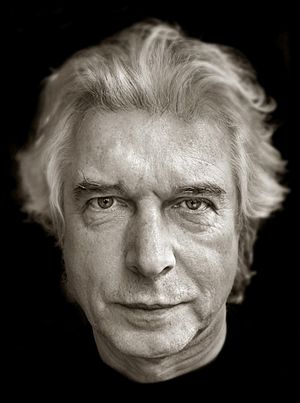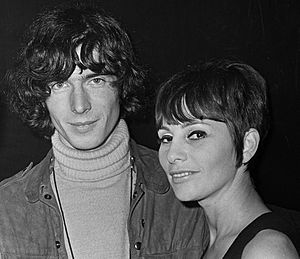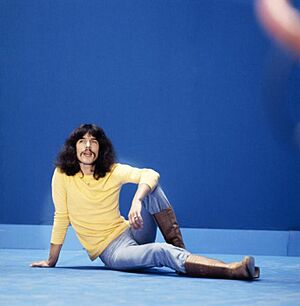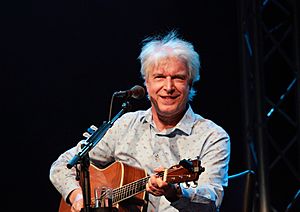Boudewijn de Groot facts for kids
Quick facts for kids
Boudewijn de Groot
|
|
|---|---|

de Groot in 2007
|
|
| Background information | |
| Birth name | Frank Boudewijn de Groot |
| Born | 20 May 1944 Batavia, Japanese East Indies |
| Genres | Folk music |
| Instruments | Vocals, guitar |
| Years active | 1964–present |
| Labels |
|
| Associated acts | Tower, Session |
Frank Boudewijn de Groot (born May 20, 1944) is a famous Dutch singer-songwriter. He is well-known for his songs, especially "Welterusten mijnheer de president" (Goodnight, Mister President), which became popular in 1966. He has had a long and successful career in music, creating many albums and hit songs.
Boudewijn de Groot: A Musical Journey
Early Life and Moving to the Netherlands
Boudewijn de Groot was born in 1944 in the Dutch East Indies (now Indonesia). At that time, it was occupied during wartime, and he was born in a Japanese concentration camp. Sadly, his mother passed away there in June 1945.
In 1946, Boudewijn and his family moved back to the Netherlands. His father had to return to Indonesia for work, so Boudewijn lived with his aunt in Haarlem. In 1951, his father came back, and in 1952, they moved to Heemstede with his new stepmother. In Heemstede, Boudewijn lived on the same street as Lennaert Nijgh, who would later become a very important lyricist (someone who writes song words) for him. Lennaert was also a friend of Boudewijn's stepbrother.
Starting His Music Career
Boudewijn met Lennaert Nijgh at school in Haarlem in 1960. Boudewijn was already singing songs like those by Jaap Fischer and Jacques Brel. Lennaert started writing lyrics for him. After high school, they both went to film academy. For a short movie Lennaert made, Boudewijn wrote two songs.
A TV journalist named Ed Lautenslager heard Boudewijn's songs and was very impressed. He helped Boudewijn get a contract with Philips, a record company. Boudewijn's first song, "Strand" (Beach), came out in 1964. He then released "Elegie prenatale" and "De morgen". He also appeared on a TV show called "Kaberet Kroniek", which made him a bit famous.
His song "Noordzee" in February 1964 was a bigger hit. But his really big breakthrough came in 1966 with "Meisje van 16" (Girl of 16). This song was an adaptation by Lennaert Nijgh of a song by Charles Aznavour. It was Boudewijn's first song to appear on a music chart. Soon after, he decided to become a full-time singer. His first album, Boudewijn de Groot, was released by Decca Records.
Becoming a Well-Known Singer
Many of Lennaert Nijgh's lyrics talked about social issues. Because of this, after his first album in 1966, Boudewijn de Groot was seen as a "protest singer." This idea became even stronger when his song "Welterusten mijnheer de president" (Goodnight, Mister President), about the Vietnam War, became very popular.
His second album, Voor de overlevenden (For the Survivors), came out later in 1966. Bert Paige, who arranged and conducted the music for this album, worked with Boudewijn for many years. In 1967, "Het Land van Maas en Waal" became Boudewijn's third hit song. He even released an English version of some songs in the U.K. under the name "Baldwin."
Boudewijn and Lennaert were influenced by the Flower Power movement. They created the album Picknick. The songs on this album had a sound similar to George Harrison's work with The Beatles. The album was well-received, and the song "Picknick" was a hit. Another song, "Meester Prikkebeen," which was a duet with Elly Nieman, also became popular. Two other songs, "Waterdrager" and "Als de rook om je hoofd is verdwenen," were minor hits in 1968.
Other Creative Work
In 1968, Boudewijn decided he didn't want to perform live anymore. He also stopped working with Lennaert Nijgh and his band. In 1969, Boudewijn worked with Eelco Gelling, a guitarist from the band Cuby and the Blizzards. They formed a group called Tower and released the song "In Your Life," which was a hit.
After this, he worked with Lucien Duzee on his fourth album, Nacht en ontij (Night and Untime). This album sounded different from his earlier work, and the songs from it didn't become big hits. The new songs from Tower also didn't do well, so Boudewijn stopped singing for a while. He moved to a farm. After a year, he returned to music, but this time as a producer for other artists like Rob de Nijs and Oscar Benton.
Returning to the Spotlight
In 1971, Boudewijn's record company released a collection of his songs called Vijf jaar hits (Five Years of Hits). It sold over 100,000 copies! Because of this, Boudewijn's songs were played on the radio a lot again. Many of his older songs became popular once more, and "Als de rook om je hoofd is verdwenen" became a hit again. Another collection, Dubbel twee, was also released.
Boudewijn started working with Lennaert Nijgh again. In 1973, they released the album Hoe sterk is de eenzame fietser (How Strong is the Lonely Cyclist). The song "Jimmy" from this album became his biggest hit in five years, showing that he was definitely back in music. Boudewijn received important Dutch music awards, an Edison and a Gouden Harp.
Boudewijn and Lennaert also helped Rob de Nijs make a comeback by writing many hit songs for him, including "Jan Klaassen de trompetter" and "Malle Babbe."
In 1975, Boudewijn wrote the album Waar ik woon en wie ik ben (Where I Live and Who I Am) with his old classmate René Daalder. The song "Ik ben Ik" (I am I) became a hit. Boudewijn then moved to California for a few months to find new ideas. He didn't release new records during this time but toured in Belgium and the Netherlands. A song he wrote in California, "Annabel," became a hit for Hans de Booy.
In April 1980, his new album Van een afstand (From a Distance) was released. It included the title song for the movie Tip van de sluier. The movie and song weren't big successes, but the album won an Edison award. Boudewijn stopped making music in 1984 after his eighth album, Maalstroom (Whirlpool).
Life After Music and Another Comeback
After stepping away from music, Boudewijn focused on translating books, composing music for films, and performing occasionally. He created music for the TV series De familie Wijntak (1986) and for movies like Lost in Amsterdam (1989) and Let the Music Dance (1990). He also composed for a Dutch version of the musical Nunsense in 1987.
Boudewijn also acted in musicals. He played the main role of Anton Chekhov in Tjechov and the role of Otto Frank in Het dagboek van Anne Frank. Using the name "Frank de Groot," he translated several novels by Stephen King and, in 2011, Scott Turow's Presumed Innocent into Dutch.
In 1996, Boudewijn de Groot released Een Nieuwe Herfst (A New Autumn). His new record company, Mercury Records, also released an album with both old and new songs. Boudewijn started touring again and appeared on TV shows. He began creating albums with Lennaert Nijgh again, and they released Een eiland in de verte (An Island in the Distance) in 2003. Sadly, Lennaert Nijgh passed away in 2002.
On January 19, 2007, Boudewijn released Lage Landen (Low Lands). He wrote most of the lyrics himself, but also used texts by Lennaert Nijgh and Freek de Jonge. This album was recorded in Nashville, USA. On February 3, 2007, Lage Landen reached the top of the music charts in the Netherlands.
On April 20, 2015, Boudewijn de Groot released Achter glas (Behind Glass). During the tour for this album, he played songs from his recent work and some rare older tracks.
Forming a Supergroup
In 2016, Boudewijn de Groot formed a "supergroup" called Vreemde Kostgangers (Strange Boarders). He joined with Henny Vrienten (the bass player from Doe Maar) and George Kooymans (the guitarist from Golden Earring). They released two successful albums in 2017 and had sold-out tours, performing their own songs and solo material.
In 2018, Boudewijn de Groot released Even weg (Just Away). He recorded this album with The Dutch Eagles, a tribute band that plays songs by The Eagles and related artists.
Retirement from Performing Live
On February 6, 2020, Boudewijn de Groot announced on a TV show that he would stop performing live after one last tour with Vreemde Kostgangers. He made this news official on his website on April 23, 2021. Because of this, the rescheduled dates for the Vreemde Kostgangers tour were canceled.
Boudewijn continued to record music. In November 2022, he released the album Windveren (Wind Feathers). This album included contributions from the band The Kik and George Kooymans (who had also stopped performing live due to being diagnosed with ALS). It also featured a song with lyrics by Lennaert Nijgh that had been lost for a long time. The album was released after the single "Aarde" (Earth), in which Boudewijn sang about the difficult relationship between Mother Earth and people.
In 2023, the third and final Vreemde Kostgangers album was released.
Personal Life
Boudewijn de Groot is married to Anja Bak. He has three children from previous marriages: Marcel, Caya, and Jim. All of his children have careers in music or acting. His granddaughter, Aysha, is also pursuing a music career under the name Meis.
Discography
Studio Albums
- Boudewijn de Groot (1966)
- Voor de overlevenden (1966)
- Picknick (1968)
- Nacht en ontij (1969)
- Hoe sterk is de eenzame fietser (1973)
- Waar ik woon en wie ik ben (1975)
- Van een afstand (1980)
- Maalstroom (1984)
- Een nieuwe herfst (1996)
- Het eiland in de verte (2003)
- Lage Landen (2007)
- Achter glas (2015)
- Even weg (2018)
- Windveren (2022)
 | Sharif Bey |
 | Hale Woodruff |
 | Richmond Barthé |
 | Purvis Young |




